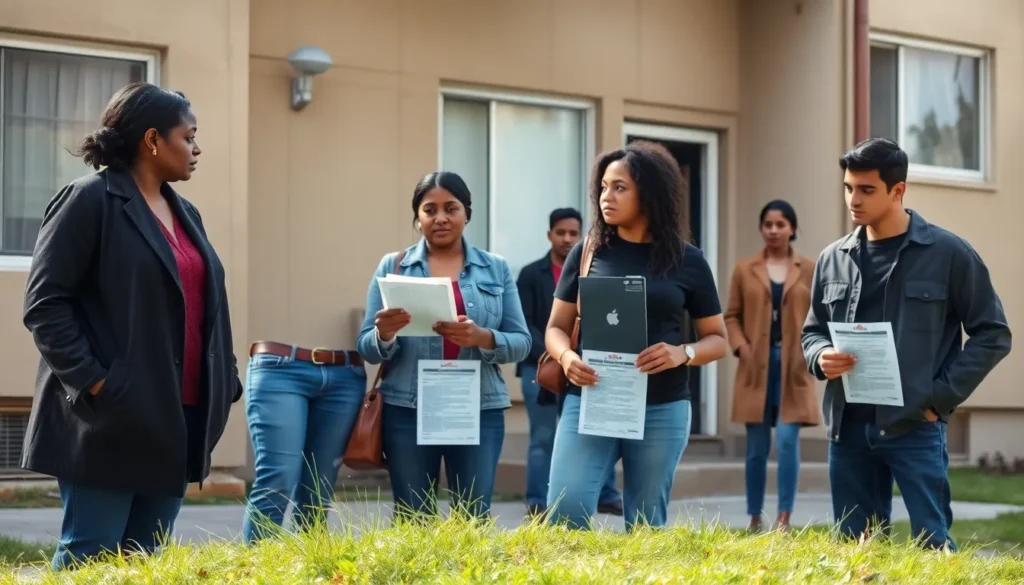Table of Contents
ToggleNavigating the world of eviction laws can feel like trying to solve a Rubik’s Cube blindfolded. One moment, you think you’ve got it figured out, and the next, you’re left scratching your head in confusion. Whether you’re a landlord eager to reclaim your property or a tenant trying to stay put, understanding these laws is crucial.
Eviction laws vary widely, and they can turn a simple disagreement into a courtroom drama faster than you can say “unlawful detainer.” With the right knowledge, you can avoid costly mistakes and maybe even get a few laughs along the way. So, buckle up as we dive into the ins and outs of eviction laws, ensuring you’re equipped to handle whatever curveballs come your way.
Overview of Eviction Laws
Eviction laws vary significantly across different jurisdictions. Tenants and landlords must understand their rights and obligations to navigate the eviction process effectively. These laws define the circumstances under which a tenant can be evicted, the notice requirements, and the procedures landlords must follow.
Understanding specific reasons for eviction is crucial. Common causes include non-payment of rent, lease violations, or illegal activities on the property. In many states, landlords must provide written notice to tenants, specifying the reason for the eviction. This notice usually grants the tenant a period to remedy the situation.
Notice periods differ based on jurisdiction. Some states require a three-day notice for non-payment of rent, while others may allow longer periods. Failure to comply with the notice can lead to formal eviction proceedings.
Landlords often initiate the eviction process by filing a complaint in court. A hearing follows, allowing both parties to present their cases. Courts generally favor tenants if proper procedures aren’t followed, emphasizing the importance of documenting every step.
Appeals and defenses can complicate eviction cases. Tenants may challenge the eviction based on retaliatory motives, uninhabitable conditions, or other legal protections. These defenses can slow the process, making it essential for landlords to understand their local regulations.
Knowledge of local eviction laws significantly affects the outcome of disputes. Both parties benefit from clear communication and adherence to established procedures. By staying informed about these laws, landlords and tenants can prevent misunderstandings, fostering a smoother rental relationship.
Types of Eviction

Understanding different types of eviction is essential for both landlords and tenants. Each type involves distinct processes and implications.
Formal Eviction
Formal eviction, often referred to as court-ordered eviction, involves a legal process initiated by the landlord. Landlords start this process by filing an eviction complaint in the appropriate court. Required notices must be served to the tenant, detailing the reasons for eviction. Depending on state laws, notice periods can vary, typically ranging from 3 to 30 days. After the notice period, if the tenant does not comply, the landlord proceeds with court proceedings. Courts evaluate the evidence provided by both parties. Failure to follow proper procedures can lead to cases being dismissed, often favoring the tenant.
Informal Eviction
Informal eviction occurs without a court order, usually involving a tenant vacating the property during the notice period. This type often arises from mutual agreements between landlords and tenants, permitting tenants to leave voluntarily. Notably, informal processes can include verbal discussions or written notices. Although this route may seem simpler, it still requires documentation to ensure clarity and protect both parties’ rights. Tenants vacating informally should always obtain proof of their move-out to avoid future disputes. Nevertheless, informal eviction lacks the legal enforcement of formal eviction, emphasizing the importance of clear communication.
Legal Procedures for Eviction
Understanding legal procedures for eviction is vital to navigate landlord-tenant disputes effectively. The eviction process involves specific steps that both parties must follow to ensure compliance with local laws.
Notice Requirements
Notice requirements serve as a crucial first step in the eviction process. Landlords usually must provide written notice to tenants outlining the eviction reasons. States set varying notice periods, with some allowing only three days for non-payment. Specific lease violations may lead to different notice durations, emphasizing the importance of knowing local regulations. Serving the notice properly is essential, as failure to do so can jeopardize the eviction case. Documentation of the served notice proves critical should the situation escalate to court.
Court Procedures
Court procedures follow notice requirements and involve filing a complaint. Upon filing, landlords initiate the legal process while providing proof of served notice. A court date is assigned, allowing landlords and tenants to present their cases before a judge. Each party has the opportunity to provide evidence supporting their position. Courts often favor tenants when landlords fail to comply with legal guidelines. The outcome hinges on proper documentation and adherence to established procedures, reinforcing the need for accurate records throughout the eviction process.
Tenant Rights and Protections
Tenants possess various rights and protections under eviction laws that differ by jurisdiction. Understanding these rights is crucial in maintaining a fair rental relationship.
Anti-Retaliation Laws
Anti-retaliation laws protect tenants from eviction circumstances that arise due to their legal actions. These laws prevent landlords from retaliating against tenants who exercise their rights, such as filing complaints about unsafe living conditions or organizing tenant unions. If a tenant raises concerns about property issues and faces eviction shortly after, these laws may provide grounds for defending against the eviction. Such protections encourage tenants to voice grievances without fear of losing their homes.
Defenses Against Eviction
Several defenses exist that tenants can use in eviction cases. Tenants may argue that the eviction notice lacked proper legal grounds or that the landlord did not follow required procedures. Proof of retaliation or an uninhabitable living environment also serves as a valid defense. It’s essential for tenants to gather evidence, including maintenance requests and communication records, to strengthen their case. Courts often prioritize tenant rights, especially when landlords fail to adhere to legal requirements.
State-Specific Variations
Eviction laws vary significantly between states, reflecting different local regulations and practices. Understanding these differences is crucial for landlords and tenants.
California Eviction Laws
California mandates specific processes for eviction. The state requires landlords to provide a written notice before initiating an eviction. Depending on the reason for eviction, this notice can vary from three to 60 days. For non-payment of rent, a three-day notice suffices. Tenants can contest evictions based on defenses like improper notice or habitability issues. Courts in California often emphasize tenant rights, reducing the likelihood of unlawful evictions. Documentation plays a vital role in these proceedings, guiding both parties toward a resolution.
New York Eviction Laws
In New York, the eviction process also follows defined procedures. Landlords must serve a notice to tenants, typically ranging from 14 to 30 days, depending on the circumstances. Non-payment of rent requires a 14-day notice, while lease violations may necessitate a 30-day notice. Tenants possess certain protections against retaliatory evictions, ensuring they can exercise their rights. New York’s courts frequently favor tenants if landlords fail to meet legal criteria, reinforcing the importance of compliance. Gathering evidence supports tenant defenses, bolstering their cases in court.
Navigating eviction laws is crucial for both landlords and tenants. Understanding the nuances of these laws can prevent misunderstandings and costly disputes. With varying regulations across jurisdictions it’s essential for both parties to stay informed about their rights and responsibilities.
Whether facing a formal eviction or considering an informal agreement clear communication and proper documentation are key. Tenants should be aware of their rights and the defenses available to them while landlords must adhere to legal procedures to protect their interests.
By fostering a respectful rental relationship and being knowledgeable about local laws both landlords and tenants can minimize conflicts and ensure a smoother rental experience.







